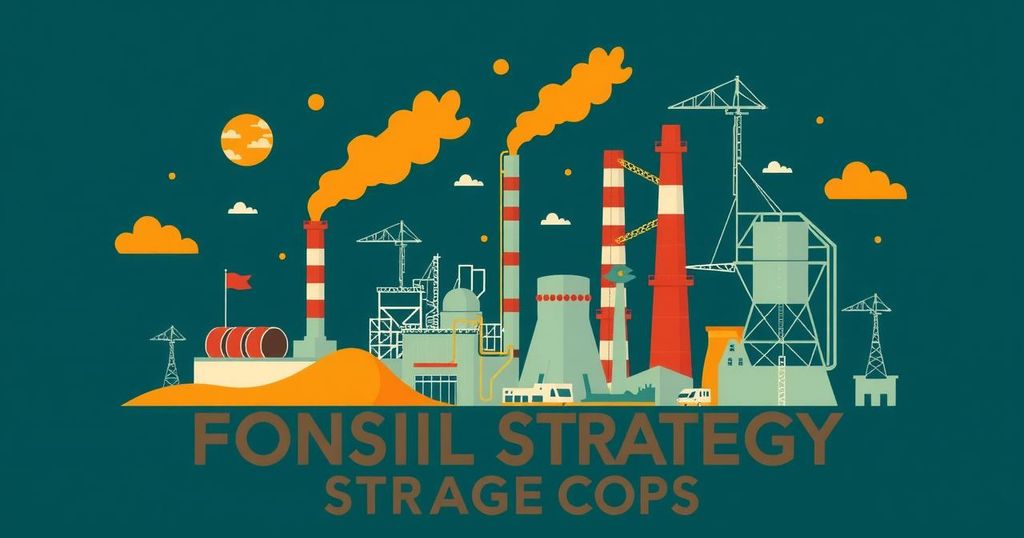The Pervasive Influence of the Fossil Fuel Industry at UN Climate COP29
At COP29 in Baku, Azerbaijan, the fossil fuel industry’s overwhelming presence, with over 1,770 lobbyists, threatens to overshadow marginalized voices and dilute climate policy objectives. Their tactics include gaining high-level access, avoiding climate finance accountability, and manipulating discussions towards their interests. This underscores the crucial challenge facing world leaders to resist corporate influence and ensure meaningful climate action that prioritizes vulnerable communities.
The fossil fuel sector’s influence at the UN climate negotiations in Baku, Azerbaijan, has raised significant concerns regarding its impact on climate policy. With over 1,770 lobbyists registered, predominantly from major oil and gas corporations, their presence significantly outnumbers that of many national delegations. This threatens to undermine voices from the Global South and marginalized communities affected by climate change. The industry’s access to negotiation leaders poses serious questions about achieving climate finance goals and ensuring a transition from fossil fuels towards sustainable energy. The fossil fuel industry not only overwhelms COP meetings with lobbyists but also employs insidious tactics such as greenwashing and misleading scientific claims. Key strategies include leveraging their numerical strength to dominate discussions, securing high-level access to critical negotiations, and simultaneously avoiding accountability for climate damages. ExxonMobil’s CEO, Darren Woods, exemplifies this trend by pushing for government incentives while simultaneously resisting necessary shifts towards clean energy. The prioritization of climate finance at COP29 is crucial, particularly for lower-income countries disproportionately impacted by climate-related disasters. Despite the fossil fuel industry’s massive profits, initiatives aimed at funding climate action, such as Azerbaijan’s Climate Finance Action Fund, have encountered setbacks. Advocates emphasize the need to compel wealthy nations to fulfill their financial responsibilities rather than rely on voluntary contributions that could dilute polluter accountability. Additionally, the fossil fuel sector capitalizes on extensive government subsidies while proposing unproven “climate solutions,” diverting crucial investments from much-needed renewable energy. Pervasive greenwashing practices are evident throughout the COP discussions, as major oil companies attempt to reframe their roles within climate action. This strategy not only distracts from genuine environmental efforts but poses significant challenges to achieving meaningful climate agreements. In light of these tactics, it is essential that world leaders recognize the dangers posed by corporate influences in climate policymaking. The fossil fuel industry’s long-standing history of deception and obstruction exemplifies the importance of maintaining integrity and prioritizing the voices of those most affected by climate change. As COP29 unfolds, the need for decisive action against fossil fuel co-optation in climate negotiations remains paramount for fostering a just and equitable global transition towards renewable energy.
The ongoing UN climate negotiations, known as COP29, have become a focal point for examining the pervasive influence of the fossil fuel industry on climate policy and decision-making. This two-week conference aims to address critical objectives, including climate finance for vulnerable nations, but the infiltration of fossil fuel lobbyists can potentially sabotage these goals. Understanding the strategies employed by the fossil fuel sector provides insight into how their participation may divert focus from urgent climate actions and undermine the overall integrity of the climate negotiations.
The fossil fuel industry’s robust presence at COP29, characterized by substantial lobbyist numbers, high-level access to negotiations, and avoidance of accountability, poses significant threats to the objectives of international climate agreements. As the event progresses, it is imperative for world leaders to confront these challenges and prioritize equitable funding and effective climate solutions that avoid the influence of polluters. A successful outcome hinges upon decisively rejecting fossil fuel interests and championing a sustainable transition to clean energy, thereby ensuring the voices of affected communities are heard and respected.
Original Source: blog.ucsusa.org




Post Comment